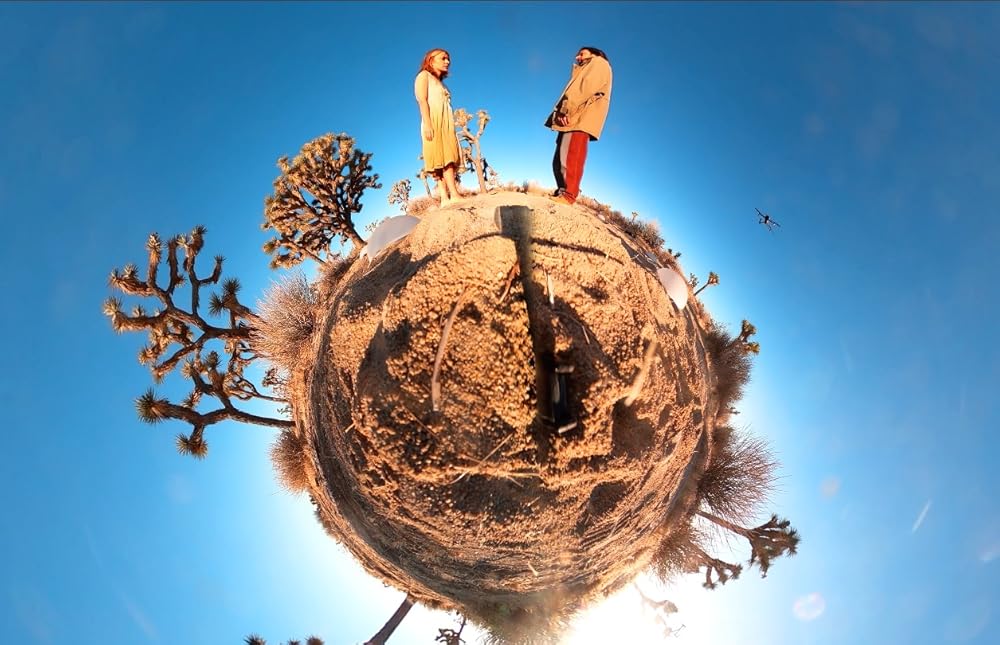
The Year of Reckoning Gets a Reckoning of Its Own
With The Code, filmmaker Eugene Kotlyarenko obliterates the sentiments that defined the age of COVID
“Take those shits off!” undergrad film student Colette Unger (Ivy Wolk) screams to the few lonely maskers at a March 2021 wedding reception in Southern California. While Wolk doesn’t show up until nearly an hour into The Code, director Eugene Kotlyarenko’s first feature film since the pandemic, the actress as known for her supporting turn in Anora as her perpetual cancellation status, somehow manages to show audiences a version of SoCal that has never graced movie screens.
Even before last January’s wildfires, hosts of studies and stats demonstrated the area’s decline as a population and cultural center. The #StayinLA movement to keep the city from hemorrhaging more media productions and professionals to the South is the most desperate political rallying cry since Jeb Bush’s begged us to “please clap,” but fading stars and the LA denizens grasping at influencer celebrity have made California apologetics a full-time job. After all, their clout hinges on the Golden State’s ability to hone their sense of superiority–one most clearly on display in the interminable COVID protocols and George Floyd hangover that became as indicative of LA culture as Venice surf shacks and the Chateau Marmont.
Such cognitive dissonance and overt hypocrisy would have proven irresistible to an artist in any other era. But it's taken half a decade for a project like The Code to come along. Any screener for a mid-tier film festival can attest that the COVID movie has become its own subgenre with budding indie filmmakers leaning in on the melodrama or the anti-masker digs as they grasp yet fall far short of the profound. From wherever midsize city suburb they hail, they still yearn for that disappearing LA life. They want to prove they’ve mastered that in-crowd language and political sensibilities. And Kotlyarenko is clearly tired of their bullshit.
Superficially, The Code has all the hallmarks of the socially conscious and self-righteous claptrap that passes for American indie cinema in our current climate: a crypto bro (Peter Vack), his amateur documentarian girlfriend (Dasha Nekrasova of Red Scare fame), dialogue about vaccines, the random insertion of TikTok videos, and even an Orson Welles epigraph about the magic of movies that kicks off the whole affair. Yet, in contrast to the hordes of indie filmmakers and BlueSky pseudo-intellectuals, Kotlyarenko proves himself sincere. Like his anti-hipster romance, Wobble Palace, and influencer satire, Spree, before it, The Code cares far less about giving the digital native generations a platform than navigating how all the posturing and social media savvy have spiritually and ethically gutted America’s Obama Age offspring.
There’s a reason why Kotlyarenko has remained a perennial guest on American Psycho author Bret Easton Ellis’s podcast. Both bring a strong moralist sensibility to their work. But while Ellis prefers the interrupt privileged spheres with the unspeakable violence they begat, Kotlyarenko aims to examine what happens when the rot never has a chance to reach the surface, eating away at its victims who mistake it as their go-to supplement for enhanced cultural superiority.
Though it begins as a meta-road documentary shot by Nekrasova’s Celine Unger, The Code is largely set at an expansive vacation house on the outskirts of Joshua Tree. Celine and Vack’s Jay Richard have made this mid-pandemic pilgrimage to reinvigorate their sex life. They’ve shared every moment in quarantine, but the prospect of real intimacy terrifies the stunted thirtysomethings. Coming off a ceremonious #MeToo pile on, Jay is left to craft bespoke NFTs for a flailing crypto company he’s only involved with thanks to the benevolence of a best friend the film presents entirely via Zoom calls. Admittedly afraid of women after his career implosion, he spends his vacation alternately spying on Celine and trying to catch her spying on him. Of course, Celine undertakes her own domestic espionage when she’s not making TikToks about spiking Jay’s spaghetti with Viagra.
As the couple gathers dossiers on each other for the cancellation they see as a cursory part of any contemporary breakup, it becomes crystal that the song and dance is merely a strategy for them to mask their actual fear of honest connection. For Kotlyarenko, the real pandemic has less to do with a virus than the hashtag posturing of the COVID and Floyd kind that purports to root itself in emotional vulnerability while hinging on soul-sapping groupthink. In The Code an unhackable OnlyFans creator account and awkward attempt to bait each other into saying racial epithets on hidden camera replace foreplay and posit that the height of lockdown madness’s moral superiority, for some, served as a worthy substitute for sexual gratification
Despite its recent premiere on Mubi and high-profile festival screenings, the film has amassed, at press time, just one review on Rotten Tomatoes. The Code’s failure to attract the indie establishment’s attention from those who were over the moon for Mubi’s awards juggernaut The Substance has many explanations from Kotlyarenko’s intentional casting of “problematic” figures like Wolk, Vack, and Nekrasova (and originally Shia LeBeouf) to a post-jab bad trip scene that calls to mind the more off-the-wall moments of Easy Rider. But such is a testament to The Code’s dissection of a moment the strivers got all so wrong, but can’t admit to without undoing their entire identities. Kotlyarenko has mastered the language of the self-professed liberators. His California Dreaming may not be pretty, but his approach sure is beautiful.
The Code is streaming on Mubi and available for digital rental.
